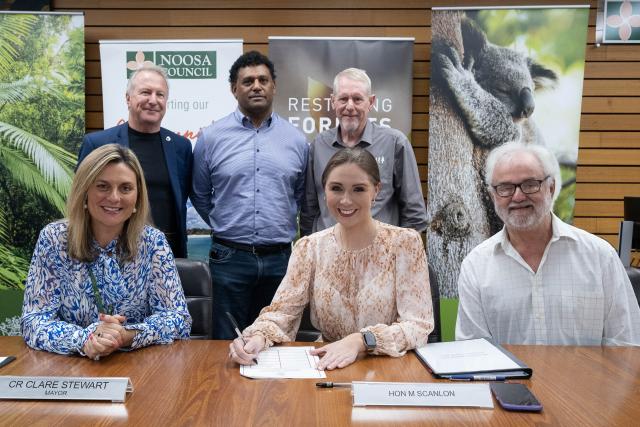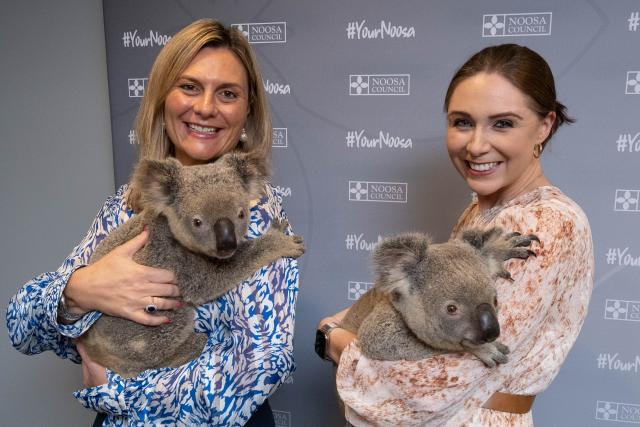More than 2400 hectares of former Noosa state forest and plantation will be added to Tewantin National Park, the Queensland Government has announced, restoring swathes of native habitat and creating new jobs.
Environment Minister Meaghan Scanlon said the Queensland Government would now turn the old Yurol Ringtail State Forest north of Cooroy into a protected area, with major revegetation works to be carried out by the Kabi Kabi People Aboriginal Corporation, Greenfleet Australia and Noosa Landcare.
Ms Scanlon said it was a great example of collaboration between the Queensland Government, councils, First Nations communities, industry and environment groups like the Noosa Parks Association to rehabilitate the environment and sprout new employment and training opportunities as part of the state’s Covid-19 Economic Recovery Plan.
“Tewantin and Noosa national parks play an incredibly important role in the local environment and also bring in thousands of tourists every year to this area – so any chance to expand it will reap huge benefits for the community,” Ms Scanlon said.
“The final harvest of pine and hardwood plantation timber in the state forest is expected to be completed soon, and following that the plantation areas will be revegetated with native species and the restored habitat progressively added to Tewantin National Park.
“Since 2015, the Palaszczuk Government has increased the amount of protected areas across Queensland by 1.2 million hectares and this latest addition is part of a $1.4 billion investment in the budget to protect the environment, create jobs and expand our national park network.
“I know local MPs Rob Skelton and Sandy Bolton have been huge advocates for this project, and I want to acknowledge their role in this, together with the Kabi Kabi People Aboriginal Corporation, community, council and industry.”
The transformation of ex-plantation state forests into new national park is part of the Yurol Ringtail Conservation Project which began in 2018 as a partnership between the Department of Environment and Science (DES), the Department of Agriculture and Fisheries (DAF), HQPlantations, Noosa Shire Council and Noosa Parks Association.
Nicklin MP Rob Skelton welcomed the outcome and said the project was expected to be completed in 2025, delivering massive conservation and social benefits for the region.
“The Kabi Kabi Peoples will work in close partnership with Queensland Parks and Wildlife Service to manage the Tewantin National Park,” Mr Skelton said.
“Many locals know Tewantin National Park provides a home for a diverse array of wildlife, and I’m looking forward to the next stages of the restoration work and the planting beginning.”
Noosa MP Sandy Bolton said Tuesday’s event was the culmination of decades of work by the community.
“This is both the end of a long-held vision and process involving many and the beginning of a new journey where, over the next few years, a total of 2400 hectares will join the Tewantin National Park,” Ms Bolton said.
“This project and partnership is especially important to the current and future generations of our flora and fauna and all Queenslanders who will benefit from venturing through these lands.”
Chair of the Kabi Kabi Peoples Aboriginal Corporation Norman Bond said the project was important for the environment and the Traditional Owners.
“Kabi Kabi People look forward to working with Greenfleet and Noosa Landcare in providing training and future employment opportunities for our people and long-term protection of our country,” Mr Bond said.
“Our goal now is to progressively increase the management role of Kabi Kabi people in working with QPWS over our National Park country.”
Greenfleet Australia will invest up to $4.5 million in this project and they will secure the exclusive right to benefit from associated carbon offsets for 30 years, and they have engaged Noosa and District Landcare to assist with tree propagation and planting when conditions on the ground are suitable.
Greenfleet chief executive officer Wayne Wescott said Greenfleet’s work combined climate action via ecosystem restoration with reconciliation that included financial, training and employment opportunities for the Kabi Kabi People.
“This project will reduce the impacts of climate change at an incredible scale – sequestering hundreds of thousands of tonnes of carbon emissions,” Mr Wescott said.
“Greenfleet is combining that with a direct revenue stream for Traditional Owners and jobs on Country for Kabi Kabi people in a rich and sustaining partnership of which Greenfleet is very proud.”
Mayor Clare Stewart said Noosa Council welcomed the support of Greenfleet, the Kabi Kabi people and Noosa District Landcare for the next phase of the Yurol Ringtail Conservation Project.
“Revegetating the former timber plantation with native trees is a critical part of the project to help generate habitat for koalas and threatened species such as the Richmond birdwing butterfly and giant barred frogs,” she said.
“Transfer of rehabilitated forestry to Tewantin National Park will ultimately double the Park’s size and create a protected corridor to the Cooloola section of the Great Sandy National Park.
“Today, buoyed by the support of our new project partners, this is one of the most significant land conservation projects Noosa Shire has ever seen.”
Michael Gloster from the Noosa Parks Association said the agreement lays the foundations for a formidable caring for country partnership with the Kabi Kabi People.
“The Noosa Parks Association has been working for a continuous national park running from Coolum to Cooloola for these past 60 years,” Mr Gloster said.
“When we started way back in 1962 there were 240 hectares and we’re now in touching distance of a continuous national park that will be over 80,000 hectares.”









